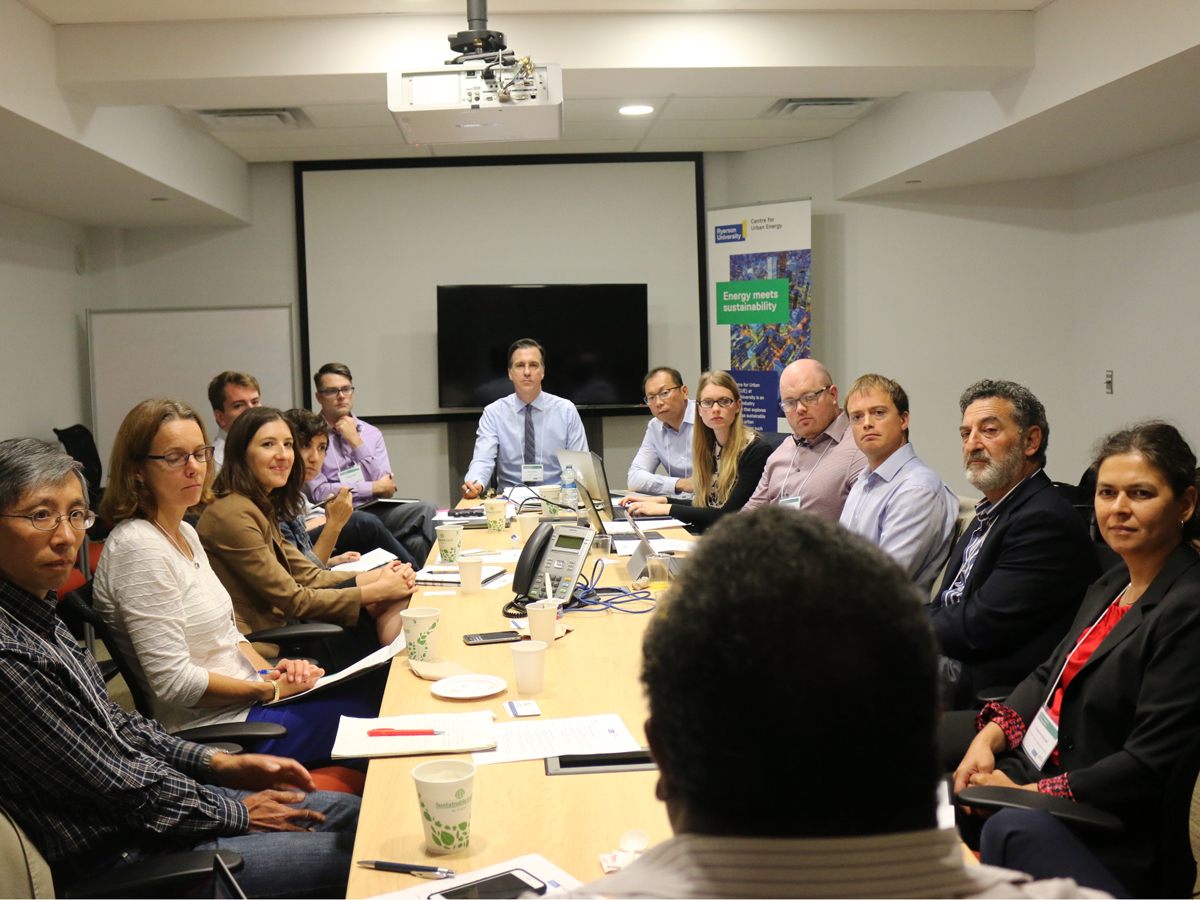Trans-Atlantic conversations on energy storage

Canada-UK Energy Storage for Utility Applications Roundtable participants gathered at the Centre for Urban Energy.
I participated in the Canada-UK Energy Storage for Utility Applications Roundtable at Ryerson University’s Centre for Urban Energy last week (21 September 2017). Supported by the NSERC Energy Storage Technology (NEST) Network and the British Consulate-General in Toronto (external link) , this meeting brought together more than 25 energy professionals from government, industry, research and other communities on both sides of the Atlantic Ocean to share experiences, to cross-fertilize ideas, and to explore potential future collaborative work.
It was a pleasure to participate. Indeed, I felt ‘in my element’, for so many of my worlds appeared to collide in the small meeting room – my own research interests (external link) (social and other policy strategies to empower advanced energy technologies for the achievement of sustainable energy), my own administrative activities (external link) (international collaboration in higher education), and my own binational character (external link) (transformative experiences in both Canada and the UK). The day’s verdict? ... ‘immensely-enjoyable’, ‘insightful’, and ‘invigorating’ are three ‘i-terms/words’ that seem apt (if offered with a bit of creative licence!). Indeed, three more ‘i-words’ also spring to mind: ‘interjurisdictional’, ‘international’, and ‘intercultural’.
With that context, let me flag five things the day got me thinking about.
- International discussions can often require a translator. Even though everyone at the Roundtable was speaking English, it soon became clear – setting aside even different accents and variations in everyday vocabulary – that specialized terminology differs in the two countries. A DNO (external link) in England is actually a LDC (external link) in Ontario – or at least close to it! – and so on. Analysts have to enter interjurisdictional conversations with open minds, ready to learn the language of the other.
- As is often the case with any kind of comparative study, there is great opportunity for mutual learning when different international experiences are allowed to reflect upon each other. In my own recent work (external link) , I had already seen how the UK’s thinking about ‘smart grids and vulnerable households’ could offer insights to Ontarians. This Roundtable revealed a variety of examples in which one jurisdiction’s experience with an advanced energy issue might be able to help the other – England and Wales’s thinking about the pros and cons of energy sector restructuring (external link) might offer insights into corporatization and privatization debates here; (PDF file) Canada’s experience with smart meters (external link) (in various provinces) might offer lessons for forthcoming policy initiatives in the United Kingdom.
- On both sides of the Atlantic, many of us are driven by similar motivations – largely these can be captured by the sentiment, ‘sustainable energy provision for societal well-being’. Details may differ – Canada’s framing on smart grids (external link) , for instance, has taken many forms; our British friends noted the ‘energy trilemma (external link) ’ (a phrase often associated with the work of the World Energy Council) – but aspirations are largely pointing us all in the same direction.
- Moreover, an understanding that progress can be accelerated by partnerships – across disciplines, across sectors, across the public/private/civil society boundaries and so on – seemed to permeate the room. But I guess that that is virtually a ‘given’ when you find professionals willing to give up valuable working time to ‘get out of their silo’ and explore ways forward by working with others.
- The time is certainly ripe for increased Canada-UK international collaboration on advanced energy issues. From the bottom-up, it builds upon the various cultural, business, academic, and other links (external link) that exist between the two countries. And, from the top-down, the two Prime Ministers emerged from meetings in Ottawa earlier this month signaling their commitment to closer cooperation (external link) . Of course, each country has its own set of international relations to manage, but many forces are now encouraging them to explore their common interests. (And it was wonderful to hear comments from Kevin McGurgan, British Consul General in Toronto (photo at right) at the Roundtable.
Thus, all in all, the day was a great success, and I offer my congratulations to the organizers! ... And what a timely reminder it was that multiple perspectives – include those that flow across jurisdictions, borders, and cultures – can generate new insights and new ways to make progress. I look forward to continued collaboration!
Ian Rowlands is an Associate Vice-President, International, and Professor in the School of Environment, Resources and Sustainability, at the University of Waterloo. This post originally appeared on the University of Waterloo website (external link) .
"On both sides of the Atlantic, many of us are driven by similar motivations – largely these can be captured by the sentiment, 'sustainable energy provision for societal well-being'"